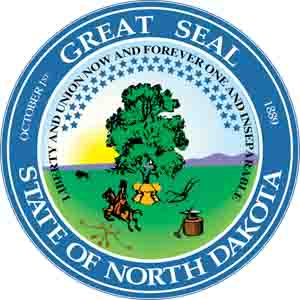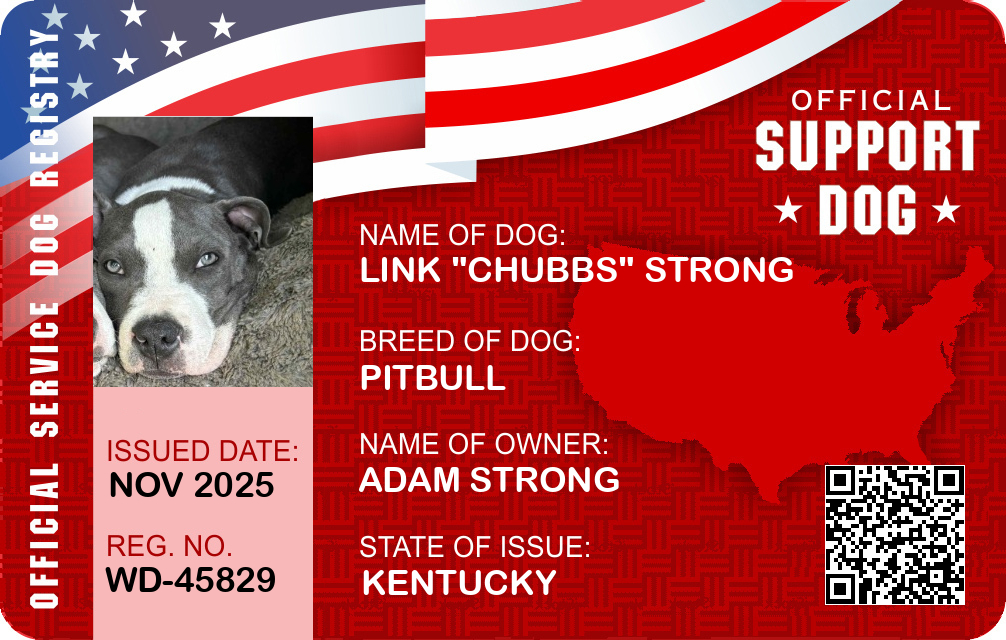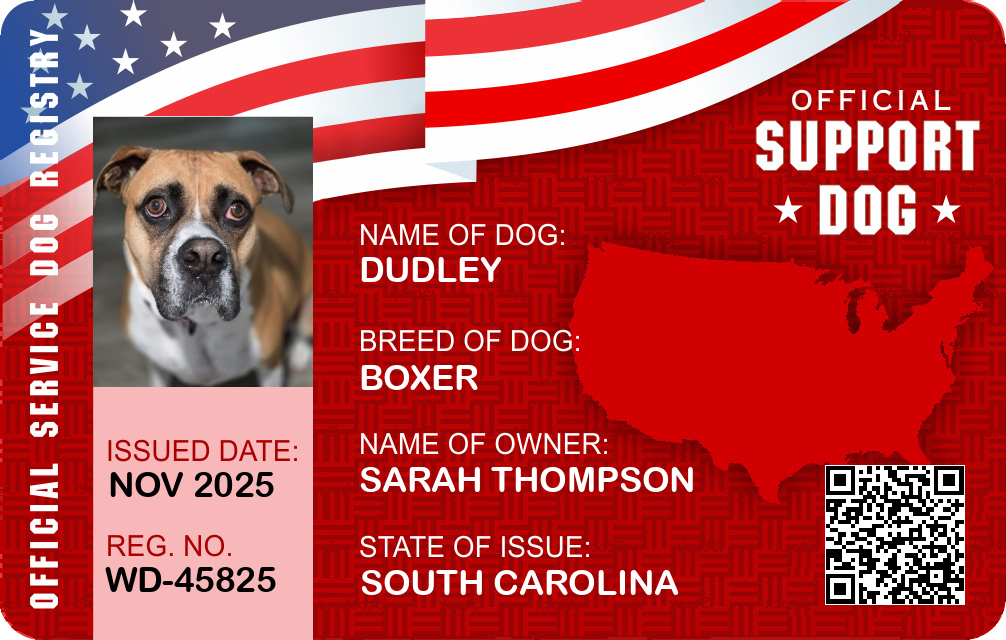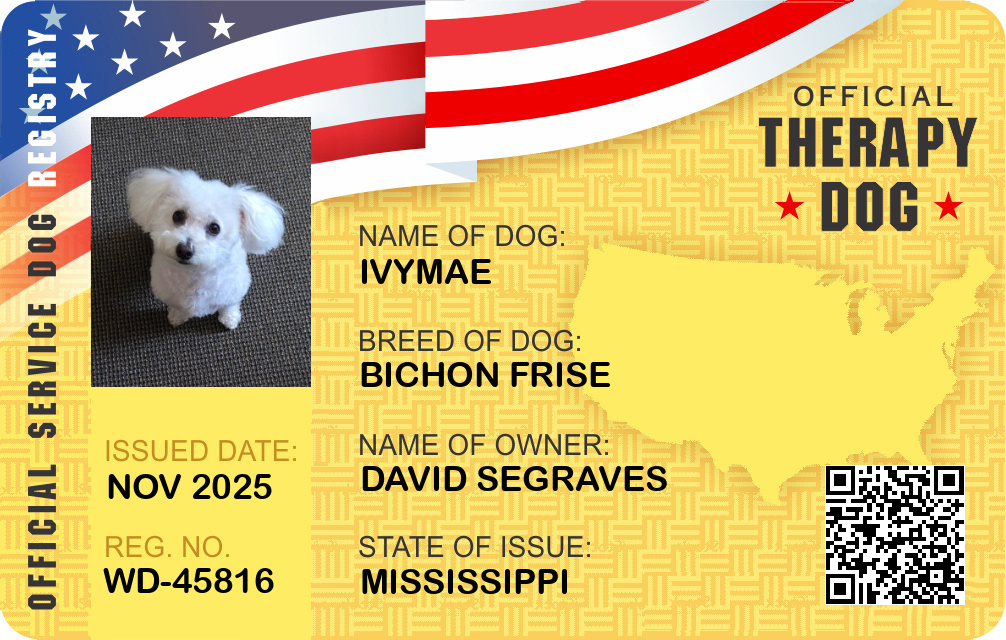North Dakota Emotional Support Animal Laws

Overview of ESAs and Legal Definitions in North Dakota
What is an Emotional Support Animal?
An Emotional Support Animal (ESA) is a companion animal that provides therapeutic benefit to individuals with mental or emotional disabilities. Unlike service animals, ESAs do not require specific training to perform tasks for their owners; rather, their mere presence helps alleviate symptoms associated with mental health issues such as depression, anxiety, or PTSD. The significance of ESAs lies in their ability to provide comfort and emotional support through their companionship.
How ESAs Differ from Service Animals
Service animals are specifically trained to perform tasks that assist people with physical disabilities. They can guide the blind, alert deaf individuals to sounds, or perform other service tasks. In contrast, ESAs do not need specialized training and are not limited to any specific type of animal, although they are most commonly dogs or cats. The legal recognition and rights of ESAs, therefore, differ from those of service animals, primarily in public access and workplace accommodations.
Key Federal Laws Affecting ESAs (e.g., FHA, ACAA)
Several federal laws impact the rights and protections of ESAs:
- Fair Housing Act (FHA): Under the FHA, ESAs are considered assistance animals, and individuals with a legitimate ESA letter can request reasonable accommodations in housing, even where pets are typically prohibited.
- Air Carrier Access Act (ACAA): This law used to provide access for ESAs on commercial airlines. However, as of January 2021, ESAs are no longer considered service animals for air travel purposes, and airlines may treat them as pets, subject to fees and restrictions.
These federal laws provide a baseline of rights for ESA owners that are further refined at the state level, such as in North Dakota.
State-Specific ESA Laws in North Dakota
Housing Rights and Responsibilities
In North Dakota, as per the guidance of the FHA, ESAs are considered in housing accommodations. This means landlords must accommodate residents with ESAs, even in pet-free properties, as long as:
- The individual provides an ESA letter from a qualified mental health professional.
- The ESA is necessary to afford the person equal opportunity to use and enjoy the dwelling.
Landlords can request documentation but cannot charge extra fees or deposits for ESAs. However, they can deny accommodation if the ESA poses a threat to others' safety or causes substantial property damage.
Public Access and Accommodation
Unlike service animals, ESAs are not granted the right to enter public spaces such as restaurants, malls, or theaters in North Dakota. Public accommodation laws do not require entities to allow ESAs unless they are qualified as service animals.
Transportation and Travel Rules
The shift in the ACAA regulations means that ESAs are no longer guaranteed free passage on airlines. In North Dakota, this aligns with federal rules allowing individual airlines to decide their policies concerning ESAs. Typically, ESAs are subject to pet travel fees and restrictions. However, ESA owners can request accommodations for ground transportation, such as buses or trains, where company policies might be more lenient.
Employment and Workplace Considerations
The Americans with Disabilities Act (ADA) requires employers to provide reasonable accommodations for employees with disabilities, including allowing service animals. However, the need to accommodate an ESA is less clear-cut. In North Dakota, employers might consider accommodating an ESA if it is demonstrated that the absence of the animal significantly impacts an employee's mental health and productivity. Any request should be substantiated with appropriate documentation from a licensed mental health professional.
Documentation, Requirements, and Processes in North Dakota
ESA Letters and Who Can Issue Them
An ESA letter is a prescription from a licensed mental health professional indicating that the presence of the animal is necessary for the individual’s emotional or mental health. In North Dakota, valid ESA letters can be issued by:
- Licensed psychologists
- Psychiatrists
Register Your Dog Instantly
These documents should be on the professional's letterhead and include their license number and contact information. It's crucial that the ESA letter is current, typically renewed annually, to ensure validity.
Registration, Certifications, and Common Misconceptions
Contrary to widespread belief, ESAs do not need to be registered or certified by any national or state organization. Any website offering ESA registration is typically profiting off a common misconception and often unnecessary. The only required documentation is a legitimate ESA letter.
Landlord, Business, and Provider Verification Rules
Landlords or service providers in North Dakota can request an ESA letter as proof but are not permitted to:
- Ask for detailed medical records
- Charge additional fees or deposits
- Deny the ESA arbitrarily without just cause
Ensuring this balance of documentation submission and rights protection is essential in managing ESA accommodations legally and effectively.
Rights, Limitations, and Legal Risks
Rights ESA Owners Have in North Dakota
ESA owners possess the right to reasonable accommodation in housing. They should expect landlords to engage in an open dialogue to facilitate their accommodation needs under state law, without facing penalties or additional fees solely because of the ESA’s presence.
Limits on ESA Protections and Common Restrictions
There are significant limitations regarding ESAs:
- Public Access: Not covered like service animals, restrictions apply in public and private non-housing settings.
- Travel: Subject to airline and transportation rules, which often treat ESAs as pets.
- Employment: Workplace accommodations are evaluated individually compared to service animals which have clear cut guidelines.
ESA owners must understand these boundaries to avoid potential legal complications or misunderstandings.
Penalties for Fraud or Misrepresentation
Misrepresenting a pet as an ESA when it does not have legitimate documentation, or claiming an ESA as a service animal, can lead to legal penalties, including fines. North Dakota law aligns with federal efforts to curb fraud in service and support animal declarations.
Practical Guidance for ESA Owners in North Dakota
How to Qualify for an ESA Legitimately
To legitimately qualify for an ESA in North Dakota:
- Consult with a licensed mental health professional to assess the need for an ESA.
- Obtain a legitimate ESA letter from the professional.
- Ensure the ESA's behavior is appropriate and won’t disrupt others.
How to Talk to Landlords, Airlines, and Employers
When engaging with landlords, airlines, or employers:
- Be proactive: Present your ESA letter upfront and discuss your need calmly and clearly.
- Understand their perspective: Know their policies and be prepared for questions or concerns they may have.
- Communicate openly: Be willing to engage in dialogue and problem-solving.
Tips for Avoiding Scams and Legal Problems
- Avoid websites offering registration or certification for a fee.
- Always verify mental health professionals' credentials before obtaining an ESA letter.
- Be honest and transparent regarding your ESA’s role and documentation.
Summary of ESA Laws in North Dakota
**
- Valid ESA letters must be issued by licensed professionals in North Dakota.
- ESAs are primarily recognized for housing accommodation under the FHA.
- Airlines may define their own policies post-ACAA revision. Confirm policies prior to travel.
- There are no public access rights for ESAs similar to service animals.
- Misrepresentation of an ESA as a service animal can result in penalties.
- Engage in open communication with all parties for smooth accommodations.
**
This comprehensive understanding of ESA laws in North Dakota helps reinforce the rightful standing and responsibilities of both ESA owners and the entities accommodating them.











